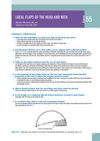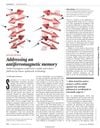 20 citations,
February 1991 in “The Journal of Dermatologic Surgery and Oncology”
20 citations,
February 1991 in “The Journal of Dermatologic Surgery and Oncology” Scalp flaps are used for reconstruction, considering factors like inelasticity, hair growth, and blood supply, with techniques adapting to age-related changes in vascularity.
 17 citations,
May 2013 in “Oral and Maxillofacial Surgery Clinics of North America”
17 citations,
May 2013 in “Oral and Maxillofacial Surgery Clinics of North America” The document concludes that careful surgical methods and choosing the right materials are key for successful scalp, skull, and frontal sinus reconstruction.

Understanding hair surface properties is key for effective hair care products.
Aesthetic rehabilitation techniques can improve life quality and wellbeing for disabled patients.
 12 citations,
July 2008 in “Facial Plastic Surgery Clinics of North America”
12 citations,
July 2008 in “Facial Plastic Surgery Clinics of North America” The document concludes that careful planning and consideration of male brow anatomy are essential for successful facial rejuvenation with cosmetic surgery.
 1 citations,
January 2010 in “Elsevier eBooks”
1 citations,
January 2010 in “Elsevier eBooks” The document concludes that local flaps are effective for reconstructive surgery in the head and neck, offering good skin match and function.
 25 citations,
January 2001 in “Facial Plastic Surgery”
25 citations,
January 2001 in “Facial Plastic Surgery” Both tissue expansion and serial excision are effective for scar revision in the head and neck area.
 20 citations,
July 1988 in “Clinics in dermatology”
20 citations,
July 1988 in “Clinics in dermatology” Thioglycolate lotions are the most popular method for permanent waving and hair straightening.
 21 citations,
September 2008 in “Magnetic Resonance Imaging”
21 citations,
September 2008 in “Magnetic Resonance Imaging” MRI can effectively image skin structures noninvasively.
 January 2016 in “Georg Thieme Verlag eBooks”
January 2016 in “Georg Thieme Verlag eBooks” Facelift surgery has evolved to focus on natural results and safety, with patient selection and postoperative care being key to success.
 86 citations,
July 1990 in “British Journal of Pharmacology”
86 citations,
July 1990 in “British Journal of Pharmacology” Diazoxide, minoxidil sulphate, and cromakalim relax rat blood vessels by opening K+ channels, with some differences in their actions.
 44 citations,
February 2016 in “Science”
44 citations,
February 2016 in “Science” Researchers developed a new type of memory using antiferromagnets that is stable, not disrupted by magnets, and works at room temperature.
 10 citations,
January 2011 in “Journal of Cutaneous and Aesthetic Surgery”
10 citations,
January 2011 in “Journal of Cutaneous and Aesthetic Surgery” Surgical methods for hair loss are less common than hair transplants but still useful, especially for scarring hair loss.
 9 citations,
May 2005 in “Facial plastic surgery”
9 citations,
May 2005 in “Facial plastic surgery” Laser hair removal can be safe and effective for dark-skinned individuals with the right laser settings.
 1 citations,
February 2018 in “The Journal of Sexual Medicine”
1 citations,
February 2018 in “The Journal of Sexual Medicine” Ultrasound shows 96% of young men with erectile dysfunction after using finasteride have abnormal penile tissue.

The conclusion is that closing scalp wounds is possible, but restoring hair without donor material is still a major challenge.
 1 citations,
September 2001 in “Dermatologic Therapy”
1 citations,
September 2001 in “Dermatologic Therapy” Estheticians in dermatology improve patient satisfaction and loyalty with proper training and planning.

L-PGDS has specific binding sites for its functions and could help in drug delivery system design.
 421 citations,
January 2015 in “Chemical Society Reviews”
421 citations,
January 2015 in “Chemical Society Reviews” Improving artificial vascular grafts requires better materials and surface designs to reduce blood clotting and support blood vessel cell growth.
 150 citations,
April 1999 in “Dermatologic Clinics”
150 citations,
April 1999 in “Dermatologic Clinics” Laser hair removal effectiveness depends on targeting hair structures without harming the skin, and improvements require more research and expert collaboration.
 40 citations,
December 1980 in “The Journal of Dermatologic Surgery and Oncology”
40 citations,
December 1980 in “The Journal of Dermatologic Surgery and Oncology” An improved scalp reduction technique reduces the need for hair grafts and has minimal complications.
 37 citations,
August 2016 in “Clinical, Cosmetic and Investigational Dermatology”
37 citations,
August 2016 in “Clinical, Cosmetic and Investigational Dermatology” The document concludes that better treatments for CCCA are needed and more research is required to understand its causes related to hairstyling and genetics.
 27 citations,
March 1994 in “Harvard Review of Psychiatry”
27 citations,
March 1994 in “Harvard Review of Psychiatry” Behavior therapy and medications, especially clomipramine, can help reduce hair pulling in people with trichotillomania.
 22 citations,
September 2018 in “Medical Clinics of North America”
22 citations,
September 2018 in “Medical Clinics of North America” Facial aging is caused by natural processes and external factors, and can be managed with preventative measures and a variety of treatments tailored to individual needs.
 19 citations,
July 2006 in “Lasers in medical science”
19 citations,
July 2006 in “Lasers in medical science” Laser hair removal is safe and effective for fair-skinned people with dark hair, and using eflornithine with laser treatments can improve results.
 16 citations,
July 2020 in “Advanced functional materials”
16 citations,
July 2020 in “Advanced functional materials” 3D cell-derived matrices improve tissue regeneration and disease modeling.
 15 citations,
January 2003 in “Lasers in Surgery and Medicine”
15 citations,
January 2003 in “Lasers in Surgery and Medicine” Cold air and a chilled sapphire window both protect the skin during laser treatments, and work better with water or gel, especially for darker skin.
 14 citations,
May 2011 in “Facial Plastic Surgery Clinics of North America”
14 citations,
May 2011 in “Facial Plastic Surgery Clinics of North America” Laser hair removal is effective for dark hair but needs improvement for nonpigmented or fine hairs.
 11 citations,
August 2020 in “Dermatologic therapy”
11 citations,
August 2020 in “Dermatologic therapy” The document concludes that mesotherapy can be effective for skin and hair treatments, but more research is needed to confirm its safety and effectiveness.
 11 citations,
September 2013 in “Otolaryngologic Clinics of North America”
11 citations,
September 2013 in “Otolaryngologic Clinics of North America” The document concludes that improving the appearance of posttraumatic facial scars is possible with careful treatment and realistic expectations.





























